The Amateur Mycologist - Valdivia, Chile
These posts are not for foraging. They are intended for entertainment and intellectual satisfaction only. These posts are not a field guide nor comprehensive in any way - their accuracy is not assured in any way. Do not eat wild mushrooms unless you are a professional, have substantial professional assistance or have a wealth of personal experience with a specific species. Do not make any foraging decisions based on these posts. To do so could be dangerous or life threatening.
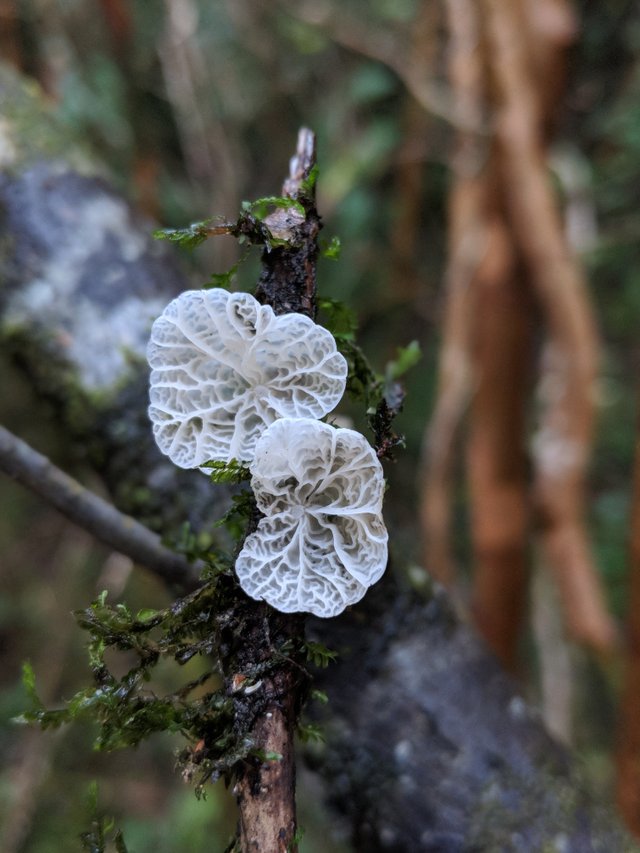
Our trip through Chile brought us to Valdivia, where we found a variety of odd balls.
Some, like Tetrapyrgos alba, this very delicate, almost lacey basidiomycete, for instance, showed up frequently on small decomposing sticks. This beautiful white mushroom was a photo favorite for anyone who ran across it.
But others hid in deeper obscurity, like the Xylaria colony below, and its accompaniment of resting spiders
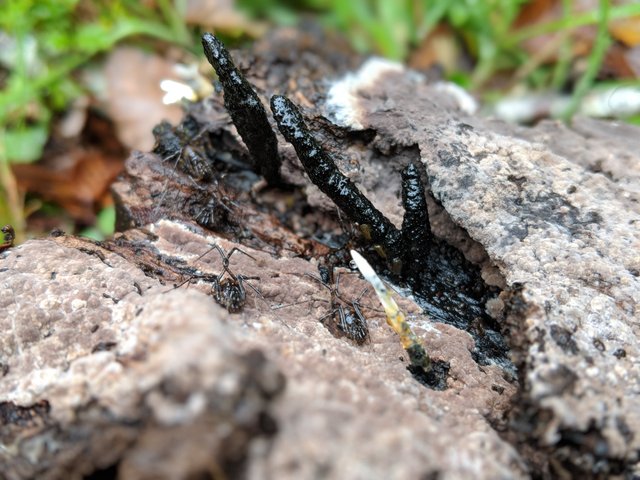
Xylaria hypoxylon and possibly a second Xylaria species looking for all the world like miniatures from the set of the Lord of the Rings.
Sometimes the best place to look for mushrooms is the underside of a log, and this was no exception. In fact, there's a lot going on in this picture fungally. The black fronds are one Xylaria species, while the light frond in the nearer foreground is Xylaria hypoxylon. Meanwhile, the spiders, locked in a kind of "oh shit" rigor mortis, seem to be resting on a bed of resupinate fungus themselves.
The wildlife on this log's underside was not limited to spiders and mushrooms
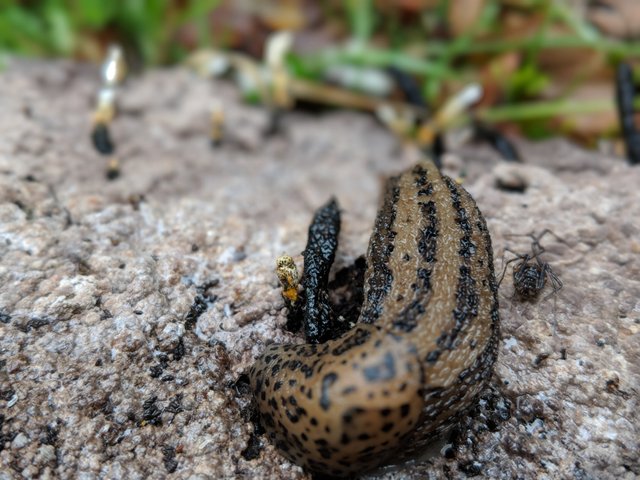
Compare this fella to Limax maximus and the resemblance is not insignificant.
Whatever the exact species of this prodigious slug, he made for a strange bedfellow in this well-defined underworld. You can make out the mottled texture of his skin, as well as the hints of the many spires of Xylaria blurred in the background.
The finds in Valdivia were not all hidden away and obscure. Some made themselves known from a surprising distance, and by surprising means.
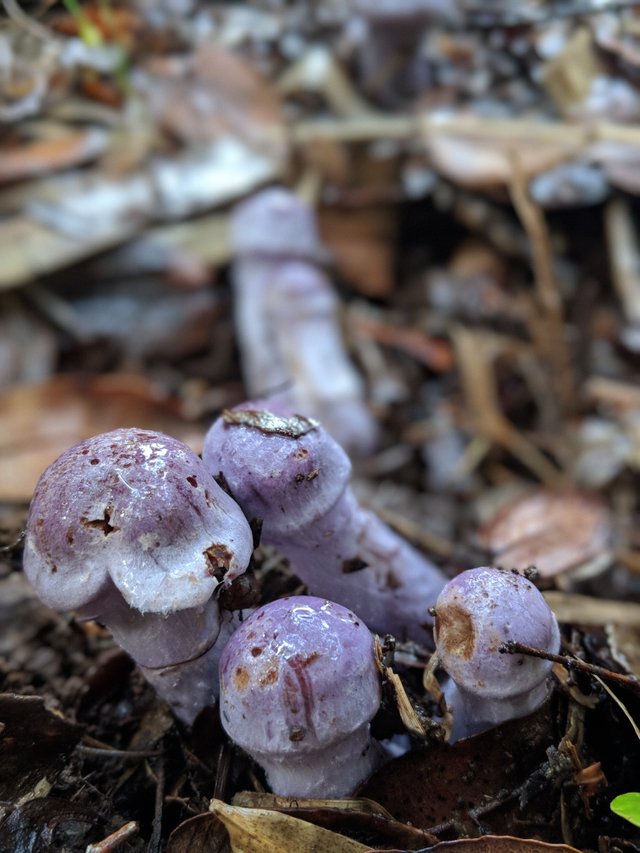
Cortinarius lebre - one of the few Cortinarius we found that can be identified without too much question.
This little species is quite beautiful IMO, a very delicate shade of purple or lilac, with slightly glistening, slightly sticky cap and obviously a cortina, this phallic little number tends to stand out visually.
But its real superpower is scent!
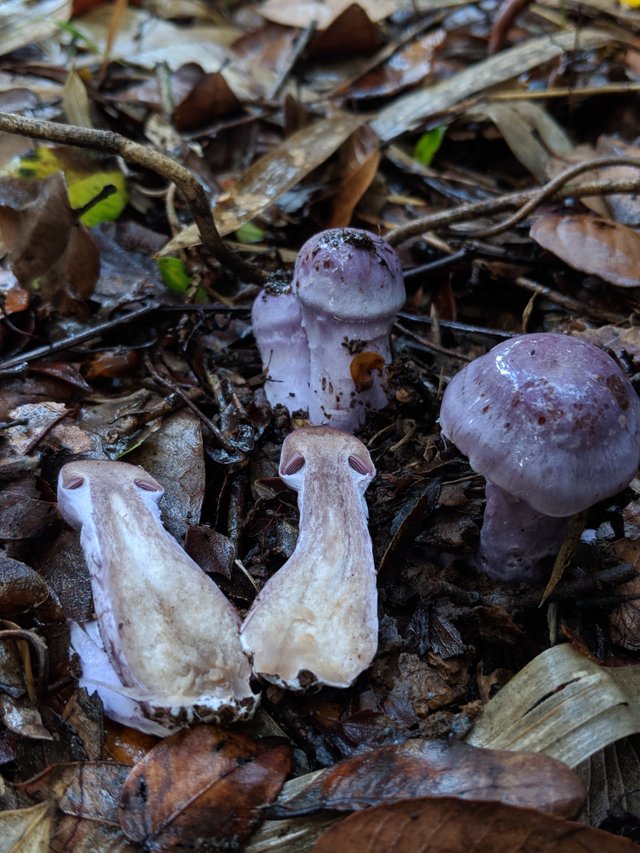
You don't need to cut C.lebre open in order to get a whiff of its extraordinarily powerful odor.
But it helps. Even as you approach the mushroom you begin to smell an intense chemical scent. To me, it smelled like something akin to a crushed up pencil eraser.
Once you cut it open and lean in for a sniff the odor hits your olfactory senses like smelling salts. It it intensely odoriferous, and not a pleasant odor either. If the unbroken mushroom smells sort of like a pencil eraser, the sliced mushroom smells like being on the floor of a pencil eraser factory. Just a nostril filling smell that drags itself all the way through your sinuses and deposits itself onto the back of your tongue.
The cut specimen was impossible not to smell, and once you knew what it smelled like, it was totally possible to find and even identify the presence of this mushroom, through smell alone.
Get done looking at the well defined photos of the partial veil and pretty underlying gills and then check out the other end of the Cortinarius spectrum below.
.jpg)
Just to highlight the wide variety and complexity of the Cortinarius genus, here's another.
This cute species could not look more different from C.lebre, and yet it is in the same genus. This species was visually a bit remarkable for the slight greenish tint of its tightly packed and elegant looking gills. But I have no idea what species it is, as is the case for many of the Cortinarius we found.
Non-Cortinarius species tended to provide more hints.
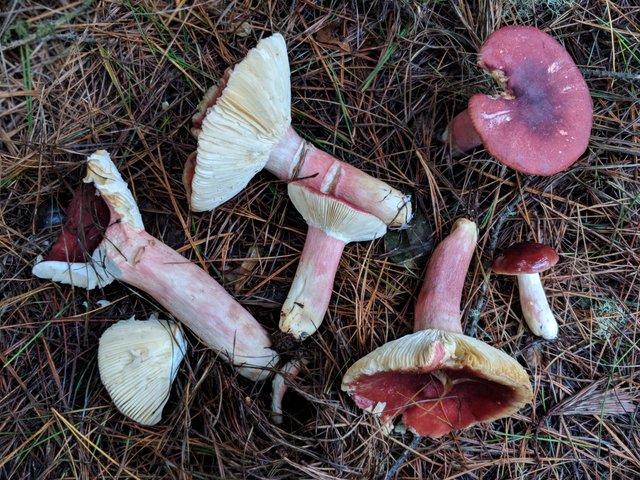
Russula aff sardonia for instance - found in the same pine forest where we discovered that boat load of Amanitas.
"Aff" in this case stands for affinity, meaning this is a Russula with, at least, an affinity or significant resemblance to a species known as sardonia. Along with the three giant Amanita species, this Russula was the fourth fungus growing in unbelievable quantities in that pine forest off the road on the way back from the park.
I was asked - as a form of jovial hazing - to take a small nibble of these fellas to confirm their acrid taste - which was fairly extreme. Often that is the case for Russula species.
Whereas these Russulas were the height of my forearm some of them, other species thrived on an altogether different scale.
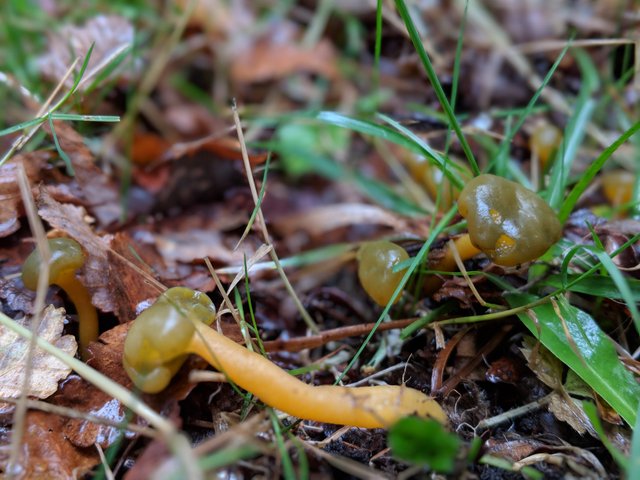
We only encountered one Leotia species, a stalked jelly mushroom.
The exact species in this case is not clear, but for general comaparisons sake you can compare to Leotia lubrica, which you can find all over the world.
Leotia mushrooms are not basidiomycetes by instead ascomycetes, meaning the spores are held in microscopic tubes or asci and then protruded out when mature.
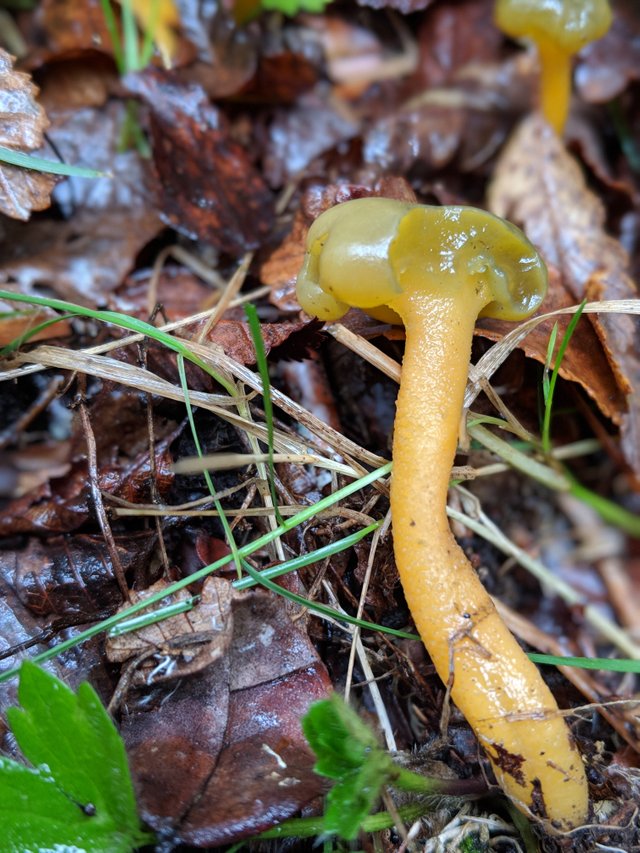
It takes only a cursory glance up close to see how these mushrooms are different from most fleshy fungi with stipes.
There is no gill structure in a Leotia species. Instead, the fertile spore surface is the jelly like cap, revealed here with a crude cross section.
Generally, you see this kind of jelly capped ascomycete growing direct off wood and stalkless. However, Leotia bucks that trend, taking a different, stalked, evolutionary route.
Last but not least
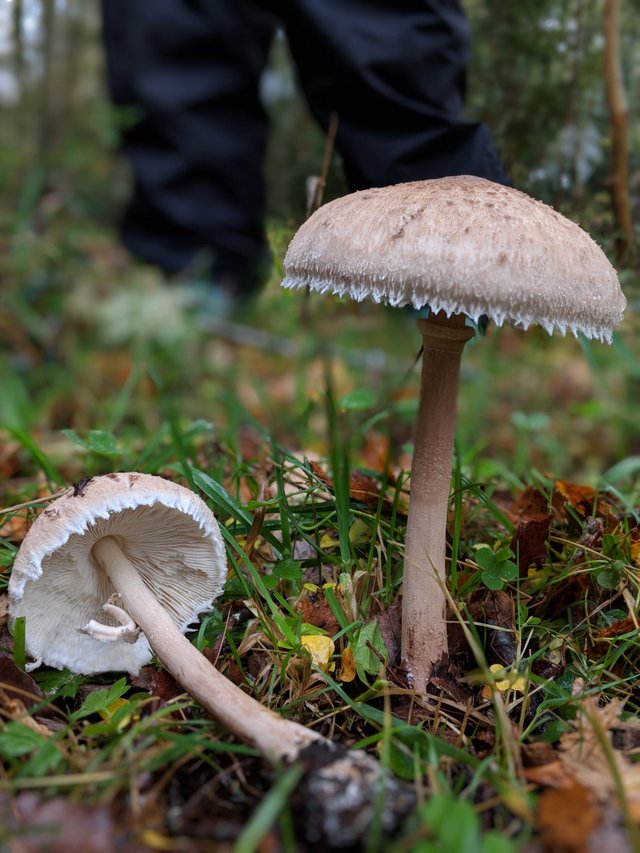
A gorgeous Chlorophyllum species.
Look at those beautiful parasol like mushrooms are just stunning I think. They were placed in the Chlorophyllum genus by one of my travel companions, although I can't say for certain that they aren't Macrolepiota for instance.
But whatever they are, boy are they pretty. The scaled cap with the gorgeous veil remnants along the edge. The movable ring on the stem, free white gills, a robust stalk, high off the ground. These mushrooms are always a pleasure to find, like stumbling across a forest pixie.
Our time in Valdivia was well spent. After this we moved on toward super beautiful Pucón, where we got to explore the most beautiful deciduous forest hidden on a large farming estate, packed to the proverbial gills with beautiful mushrooms.
All Photos Are My Own
Information Sources:
- Giuliana Furci, Hongos De Chile, Volume I, Reimpresion corregida 2016
Wikipedia on Muscimol - Primary sources were several of the mycologists I went on the trip with in this case, whose photos and identifications I had access to in preparing this post.
- Wikipedia on Chlorophyllum Genus
- Wikipedia on Leotia Genus
- Mushroomobserver.org on Tetrapyrgos alba
- Messiah College On Xylaria hypoxylon
- Kuo, M. (2008, October). The genus Xylaria. Retrieved from the MushroomExpert.Com Web site
- Wikipedia on Russula sardonia
- Wikipedia on Limax maximus
Please support @Steemstem and the #Steemstem community, dedicated to bringing and supporting high quality STEM related content on Steemit.
Let me clarify what I mean by "support." There are a number of good options.
Head over to the steemstem discord channel and the #steemstem tag and start talking with the other users involved in the community, commenting and upvoting on their submissions.
If, like me, you can hardly find time to post your own material once a week, then consider joining the steemstem autovote trail, which you can inquire about on said discord channel.
Or, if, like me, time is very difficult to give to the community, then consider making a delegation. Presently, and for the last half year, I have delegated a third of my SP to the @steemstem account.
wow what gems you have found in Chile, the variety is amazing and the first photo the Tetrapyrgos alba is really something and the Xylaria is fascinating, the spiders are pretty awesome too. what abundance you experienced, really great to check back in with you @dber and learn and Discover some more. Thank you
Thank you as always @trucklife-family! No doubt I was very lucky to have gone on this trip - life long memories for sure.
gorgeous !
Gorgeous!
I had a fungal explosion in one of my garden beds the last couple days that was pretty cool to observe. Glad I found your post. Upped and resteemed because it's an awesome post!
They have been growing like crazy around me - tons of rain recently
I've been scrolling down your blog. You have been travelling a lot while searching for different kinds of mushrooms. Definitely a mushroom guy. What kind of camera were you using?
Just my Pixel 2! I needed a new phone and decided to get that one right before my trip specifically with mushroom photos in mind. Since then I've gotten a macro lens for it as well
I see. Pixel 2's camera quality is quite great.
Hi @dber!
Your post was upvoted by utopian.io in cooperation with steemstem - supporting knowledge, innovation and technological advancement on the Steem Blockchain.
Contribute to Open Source with utopian.io
Learn how to contribute on our website and join the new open source economy.
Want to chat? Join the Utopian Community on Discord https://discord.gg/h52nFrV
so nice photography i like post and resteem my friend @dber
This post has been voted on by the steemstem curation team and voting trail.
There is more to SteemSTEM than just writing posts, check here for some more tips on being a community member. You can also join our discord here to get to know the rest of the community!
Congratulations @dber! You have completed the following achievement on Steemit and have been rewarded with new badge(s) :
Click on the badge to view your Board of Honor.
If you no longer want to receive notifications, reply to this comment with the word
STOPAlmost every mushroom here looks like something else. This post really showcases the great variety of mushrooms, in both shape and color. They've less to envy from the world of flowers and animals than most would assume.
I was really interested to find your post @dber ( thanks to @pennsif ) on two counts : I'm originally from Chile and, two, I'm trying to learn about mushrooms. I live in Wales UK and often get reminders of the South of Chile when I walk these parts. All good wishes